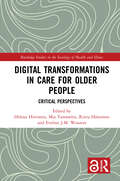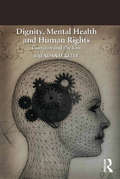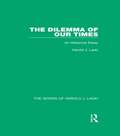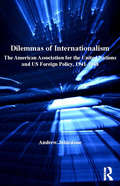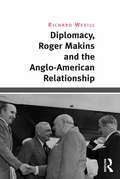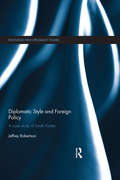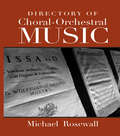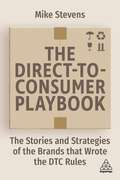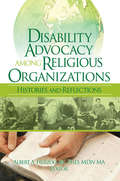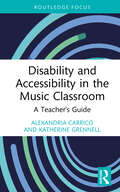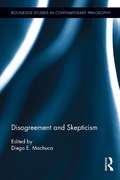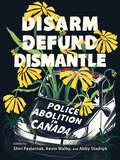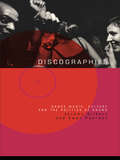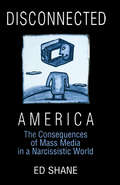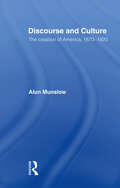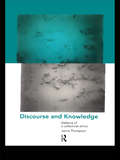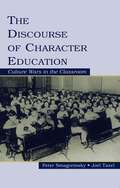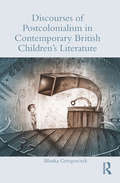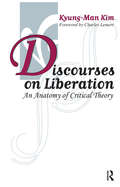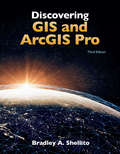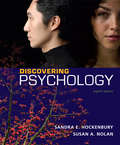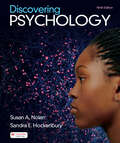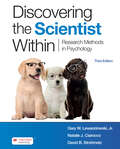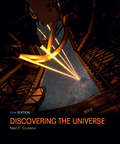Special Collections
Benetech’s Global Certified Accessible Titles
Description: Benetech’s GCA program is the first independent third-party EPUB certification to verify ebook accessibility. By creating content that is born accessible, publishers can meet the needs of all readers. Learn more: https://bornaccessible.benetech.org/
- Table View
- List View
Digital Transformations in Care for Older People
by Helena Hirvonen, Mia Tammelin, Riitta Hänninen and Eveline J.M. WoutersThe book investigates digitalisation in care for older people by giving insight into service users’ and professionals’ opportunities to digital agency in the context of European welfare states. With a focus on service users and providers experiences of digital care, the contributions address the manifold and often contradictory consequences of active ageing policies and innovation programmes. To assess digital agency of older people, ageism and co-creation in the innovation processes as well the use of digital platforms are addressed, while care professionals’ digital agency is examined through empirical cases that focus on the interaction between human and non-human actors in long-term care services, the temporality and spatiality of care, and the organisational requirements for successful implementation of digital technologies. From a variety of conceptual and theoretical viewpoints, the chapters provide a comprehensive and timely overview of ways to address the phenomena of ageing and digitalisation. The book provides critical vantage points to academic readership, health and social care professionals, policymakers, other stakeholders as well as the general audience on the effects of digitalisation in care for older people.
Dignity, Mental Health and Human Rights
by Brendan D. KellyThis book explores the human rights consequences of recent and ongoing revisions of mental health legislation in England and Ireland. Presenting a critical discussion of the World Health Organization's 'Checklist on Mental Health Legislation' from its Resource Book on Mental Health, Human Rights and Legislation, the author uses this checklist as a frame-work for analysis to examine the extent to which mental health legislation complies with the WHO human rights standards. The author also examines recent case-law from the European Court of Human Rights, and looks in depth at the implications of the United Nations Convention on the Rights of Persons with Disabilities for mental health law in England and Ireland. Focusing on dignity, human rights and mental health law, the work sets out to determine to what extent, if any, human rights concerns have influenced recent revisions of mental health legislation, and to what extent recent developments in mental health law have assisted in protecting and promoting the human rights of the mentally ill. The author seeks to articulate better, clearer and more connected ways to protect and promote the rights of the mentally ill though both law and policy.
The Dilemma of Our Times
by Harold J. LaskiThis book, originally published in 1952, unfinished and perhaps imperfect, is the last book of one of the most acute political thinkers of the twentieth century. Laski’s earlier optimism about a swing to the Left was beginning to be reversed, and in this volume he saw the defects of his previous optimistic surveys, which, in his opinion, still had value, but needed to be brought up-to-date and consquently he began to write an additional chapter which was never completed. It remains a valuable last word of an author who for thirty years was respected and listened to on the topic of civilisation’s survial through change.
Dilemmas of Internationalism
by Andrew JohnstoneDilemmas of Internationalism is a new political history of the 1940s which charts and analyses the efforts of private internationalists to define US internationalism and promote the establishment of the United Nations. Internationalists hoped that the United States would shake off the fear of entangling alliances that had characterised the nation's history, replacing isolationism and unilateralism with a new, involved and multilateral approach to foreign affairs. During and after World War II, a number of private individuals and organisations were at the forefront of the fight to change the nature of US foreign policy. This book focuses in particular on the most important internationalist organisation: the American Association for the United Nations (AAUN), known as the League of Nations Association through 1944. It situates the AAUN in the vast network of private organisations promoting an internationalist foreign policy during and after World War II, and analyses the connections between the AAUN and the US government and key public figures who proposed a more internationalist foreign policy. One of the most innovative aspects of Dilemmas of Internationalism is its focus on state-private interaction with regard to defining internationalism. Most previous works on wartime internationalism neglect considerations of state-private interaction, or fail to significantly develop them. The study also acts as a corrective to the general neglect of state-private interaction during this period, turning attention away from the common focus on the Cold War to the crucial phase during and immediately after World War II. Beginning with the US entry into the War, this study continues through the onset of the Cold War to early 1948, ending with the passing of the Marshall Plan. By 1948, the path of US internationalism appeared firmly fixed by a Cold War framework, but in 1941, US entry into the Second World War offered the opportunity to develop a more multilateral approach to foreign affairs, and create a more just and peaceful world. This book is a much-needed history of the attempt to seize that opportunity.
Diplomacy, Roger Makins and the Anglo-American Relationship
by Richard WevillThe history of Britain after the Second World War is essentially the story of her loss of great power status. Writers discussing this decline often focus on those sources of power which are tangible and capable of measurement: the size of a country’s armed forces, her Gross Domestic Product, or her energy reserves. But there are other real sources of power which are not so easily measured. The morale of a nation, the quality, integrity and stability of a country’s political system and a nation’s sense of unity are all intangible elements. So is diplomatic skill, which is central to the ability of one country to influence another. Roger Makins, the British Ambassador to Washington 1953-1956, was one of the most prominent and powerful diplomats of his time. His career was unusual for a Foreign Office official, in that such a large part of it took place in Washington and London, and was centred on Anglo-American relationships. This book describes his life, times and the important players he dealt with on both sides of the Atlantic. It is history seen through the perspective of the officials trying to serve their countries’ interests, and as such it sheds a new light on how the ’special relationship’ between Britain and America developed. It also shows the impact on policy a civil servant, who worked and negotiated with almost every important American and British politician and official of his time, can have.
Diplomatic Style and Foreign Policy
by Jeffrey RobertsonThe book explores diplomatic style and its use as a means to provide analytical insight into a state’s foreign policy, with a specific focus on South Korea. Diplomatic style attracts scant attention from scholars. It is dismissed as irrelevant in the context of diplomacy’s universalism; misconstrued as a component of foreign policy; alluded to perfunctorily amidst broader considerations of foreign policy; or wholly absented from discussions in which it should comprise an important component. In contrast to these views, practitioners maintain a faith-like confidence in diplomatic style. They assume it plays an important role in providing analytical insight, giving them advantage over scholars in the analysis of foreign policy. This book explores diplomatic style and its use as a means to provide analytical insight into foreign policy, using South Korea as a case study. It determines that style remains important to diplomatic practitioners, and provides analytical insight into a state’s foreign policy by highlighting phenomena of policy relevance, which narrows the range of information an analyst must cover. The book demonstrates how South Korea’s diplomatic style – which has a tendency towards emotionalism, and is affected by status, generational change, cosmopolitanism, and estrangement from international society – can be a guide to understanding South Korea’s contemporary foreign policy. This book will be of much interest to students of diplomacy studies, foreign policy, Asian politics, and International Relations in general.
Directory of Choral-Orchestral Music
by Michael RosewallFirst published in 2007. Routledge is an imprint of Taylor & Francis, an informa company.
The Direct to Consumer Playbook
by Mike StevensBuild your DTC brand by learning from the best. As consumer buying habits continue to shift, more and more brands are turning their attention to e-commerce and selling direct. However, few manage to succeed at scale.Overcome the challenges of the ever-increasing cost of marketing, the demands of customer service, complicated logistical requirements and the perils of selecting the right technology by learning from the DTC pioneers who have got it right. Read the founding stories, strategies, failures and eventual success of DTC brands such as Huel, graze, Snag, tails.com, Who Gives a Crap, Casper, Lick, allplants, Bloom & Wild and more to discover: · How they got started, what worked then and what works now· The importance of building a community and how to use data· When to consider going multichannel· Why you need a bulletproof brand· Navigating funding, margins, growth, customer service and product development and moreFor the first time, the best in class of DTC share their playbooks so that you can understand and build on their successes.
Disability Advocacy Among Religious Organizations
by Albert A HerzogGain insight into the importance of advocacy for the disabled within various religious and secular organizationsYou shall love your neighbor as yourself. (Romans 13:9) Through the years, religious organizations have worked to fulfill this biblical mandate. Disability Advocacy Among Religious Organizations: Histories and Reflections chronicles the progress of different ministries&’ advocacy for the disabled since 1950 as they worked toward fulfilling this mission. This enlightening history of several religious organizations&’ efforts charts the trends in advocacy while offering readers insight into ways to assist people with disabilities both within religious organizations and in society. Issues are explored by drawing upon numerous documents, communications, and in-depth reviews of the advocates&’ work.This book draws together in a single volume the stories of various religious organizations and their struggles to advocate for the disabled. Because of society&’s tendency to isolate and fear them, special needs individuals such as the mentally and physically disabled have long found it difficult to be accepted, understood, or to receive proper care. However, ministries strive to be advocates for all of their members and their needs, including education, treatment, and appropriate legislation. Disability Advocacy Among Religious Organizations: Histories and Reflections recounts the steps organizations have taken to focus on ending isolation and fear through inclusion and appropriate care of members with various disabilities. These historical accounts examine the depth, breadth, and on-going need for disability advocacy in religious organizations.Disability Advocacy Among Religious Organizations: Histories and Reflections discusses the advocacy backgrounds of: the World Council of Churches the National Council of Churches National Catholic Partnership on Disability National Apostolate for Inclusion Ministry American mainline Protestant denominationsthe American Baptist Convention, Disciples of Christ, the Episcopal Church, the Evangelical Lutheran Church in America, the Presbyterian Church USA, the United Methodist Church, and the United Church of Christ the Christian Reformed Church American Association on Mental Retardation (AAMR) Religion and Spirituality Division Bethesda Lutheran homes and Services, Inc. the Christian Council on Persons with Disabilities (CCPD) Friendship Ministries Joni and Friends the Mennonite advocacy for persons with disabilities the Religion and Disability Program of the National Organization on DisabilityDisability Advocacy Among Religious Organizations: Histories and Reflections is valuable reading for clergy and laypeople in disability advocacy in religious organizations, educators, students, seminary students preparing for ministries, and religious historians.
Disability and Accessibility in the Music Classroom
by Alexandria Carrico and Katherine GrennellDisability and Accessibility in the Music Classroom provides college music history instructors with a concise guide on how to create an accessible and inclusive classroom environment. In addition to providing a concise overview of disability studies, highlighting definitions, theories, and national and international policies related to disability, this book offers practical applications for implementing accessibility measures in the music history classroom. The latter half of this text provides case studies of well-known disabled composers and musicians from the Western Art Music canon from the Middle Ages to the Twentieth Century as well as popular music genres, such as the blues, jazz, R&B, pop, country, and hip hop. These examples provide opportunities to integrate discussions of disability into a standard music history curriculum.
Disability in Jewish Law
by Tzvi C. MarxIn recent decades, record numbers of Jews are taking a newfound interest in their legal heritage - the Bible and the Talmud, the law codes and the rabbinical responsa literature. In the course of this encounter, they may be interested in how these sources relate to the issue of disability, and the degree to which halakhic attitudes to disability are in harmony with contemporary sensibilities. For example, can the blind or those in wheelchairs serve as prayer leaders? Need the mentally incompetent observe any ritual law? Is institutionalization in a special-education facility where Jewish dietary laws are not observed permitted if it will enhance a child's functioning? And how are we to interpret teachings that seem inconsonant with current sensibilities? Disability in Jewish Law answers the pressing need for insight into the position of Jewish law with respect to the rights and status of those with physical and mental impairments, and the corresponding duties of the non-disabled.
Disagreement and Skepticism
by Diego E. MachucaThe thirteen essays in this volume explore for the first time the possible skeptical implications of disagreement in different areas and from different perspectives, with an emphasis in the current debate about the epistemic significance of disagreement. They represent a new contribution to the study of the connection between disagreement and skepticism in epistemology, metaethics, ancient philosophy, and metaphilosophy.
Disarm, Defund, Dismantle
by Kevin Walby and Shiri Pasternak and Abby StadnykCanadian laws are just, the police uphold the rule of law and treat everyone equally, and without the police, communities would descend into chaos and disorder. These entrenched myths, rooted in settler-colonial logic, work to obscure a hard truth: the police do not keep us safe. This edited collection brings together writing from a range of activists and scholars, whose words are rooted in experience and solidarity with those putting their lives on the line to fight for police abolition in Canada. Together, they imagine a different world—one in which police power is eroded and dissolved forever, one in which it is possible to respond to distress and harm with assistance and care.
Discographies
by Jeremy Gilbert and Ewan PearsonExperiencing disco, hip hop, house, techno, drum 'n' bass and garage, Discographies plots a course through the transatlantic dance scene of the last last twenty-five years. It discusses the problems posed by contemporary dance culture of both academic and cultural study and finds these origins in the history of opposition to music as a source of sensory pleasure.Discussing such issues as technology, club space. drugs, the musical body, gender, sexuality and pleasure, Discographies explores the ecstatic experiences at the heart of contemporary dance culture. It suggests why politicians and agencies as diverse as the independent music press and public broadcasting should be so hostile to this cultural phenomenon.
Disconnected America
by Michael C. Keith and Ed ShaneEd Shane here traces a change in the American pervasive mass media that once disseminated information quickly and stimulated mass cultural response, to a de-massified individual media that incubate a new electronic narcissicism, producing an inwardly-focused society.
Discourse and Culture
by Alun MunslowWritten history is literary artifact: taking this as its starting point, Discourse and Culture argues that the Foucauldian concept of the shifting scale of linguistic and historic values must be the central focus for a new interpretation of American culture and ideology. Six major American historical figures are evaluated as products of the conflict between subordinate and dominant influences in American society: steelmaster Andrew Carnegie; labour leader Terence V. Powderly; historian of the West Frederick J. Turner; social reconstructionist Jane Addams; race leader Booker T. Washington; and black nationalist W.E.B. du Bois. Discourse and Culture re-assesses the relationship between ideology and cultural formation by asking if cultural change can be explained as a function of discourse. The book draws upon the ideas of Althusser, Gramsci and Hayden to address this issue, which lies at the very heart of contemporary debate on the character of cultural history.
Discourse and Knowledge
by Janna ThompsonEthical disagreement is a fact of social life. We disagree about issues such as abortion, euthanasia, the meaning of justice and the treatment of animals, and our debates often fail to reach a consensus. Some philosophers think that this means there is no objective knowledge about morality. Discourse and Knowledge takes a radically different approach to the defence of ethical rationality. It claims that there is a correct solution to ethical controversies, but that ethical decisions have to be made collectively. Written specifically for those studying or teaching ethics or moral theory,Discourse and Knowledge will also be ideal for those on courses on social theory, ethics or feminist philosophy.
The Discourse of Character Education
by Peter Smagorinsky and Joel TaxelIn this book Peter Smagorinsky and Joel Taxel analyze the ways in which the perennial issue of character education has been articulated in the United States, both historically and in the current character education movement that began in earnest in the 1990s. The goal is to uncover the ideological nature of different conceptions of character education. The authors show how the current discourses are a continuation of discourse streams through which character education and the national purpose have been debated for hundreds of years, most recently in what are known as the Culture Wars--the intense, often passionate debates about morality, culture, and values carried out by politicians, religious groups, social policy foundations, and a wide range of political commentators and citizens, in which the various stakeholders have sought influence over a wide range of social and economic issues, including education. The centerpiece is a discourse analysis of proposals funded by the United States Department of Education's Office of Educational Research and Improvement (OERI). Discourse profiles from sets of states that exhibit two distinct conceptions of character are examined and the documents from particular states are placed in dialogue with the OERI Request for Proposals. One profile reflects the dominant perspective promoted in the U.S., based on an authoritarian view in which young people are indoctrinated into the value system of presumably virtuous adults through didactic instruction. The other reflects the well-established yet currently marginal discourse emphasizing attention to the whole environment in which character is developed and enacted and in which reflection on morality, rather than didactic instruction in morality, is the primary instructional approach. By focusing on these two distinct regions and their conceptions of character, the authors situate the character education movement at the turn of the twenty-first century in the context of historical notions about the nature of character and regional conceptions regarding the nature of societal organization. This enlightening volume is relevant to scholars, practitioners, policymakers, and students across the field of education, particularly those involved in character education, moral development, discourse analysis, history and cultural foundations of education, and related fields, and to the wider public interested in character education.
Discourses of Postcolonialism in Contemporary British Children's Literature
by Blanka GrzegorczykThis book considers how contemporary British children’s books engage with some of the major cultural debates of recent years, and how they resonate with the current preoccupations and tastes of the white mainstream British reading public. A central assumption of this volume is that Britain’s imperial past continues to play a key role in its representations of race, identity, and history. The insistent inclusion of questions relating to colonialism and power structures in recent children’s novels exposes the complexities and contradictions surrounding the fictional treatment of race relations and ethnicity. Postcolonial children’s literature in Britain has been inherently ambivalent since its cautious beginnings: it is both transgressive and authorizing, both undercutting and excluding. Grzegorczyk considers the ways in which children’s fictions have worked with and against particular ideologies of race. The texts analyzed in this collection portray ethnic minorities as complex, hybrid products of colonialism, global migrations, and the ideology of multiculturalism. By examining the ideological content of these novels, Grzegorczyk demonstrates the centrality of the colonial past to contemporary British writing for the young.
Discourses on Liberation
by Kyung-Man Kim"Kyung-Man Kim offers a comprehensive inventory of the obstacles the most powerful and influential thinkers of our time tried to overcome, the questions they asked without finding good answers, and the questions they've overlooked or avoided. No one concerned with the ethical impact of knowledge and the role it may play in winning the case of human freedom can neglect Kyung-Man Kim's analysis." -Zygmut Bauman "This is a powerful book, compelling for every reader who wants to know how current sociological theory can be used to change, not just interpret, the social world. Kyung-man Kim offers masterful readings of the main theoretical formations of the last century." -Norman K. Denzin, University of Illinois "A lucid exposition and critique of Bourdieu, Giddens, and Habermas, and of the phenomenological ethnographies of Garfinkel and the ethnomethodologists who provided their starting point. Kim, who has honed his skills in his acute contributions to the hyper-reflexive sociology of scientific knowledge, now successfully takes on the big game of the emancipatory theory world. -Randall Collins, University of Pennsylvania What binds the theoretical work of Pierre Bourdieu, Anthony Giddens, and Jurgen Habermas? Although these and other contemporary theorists offered major critiques of society, they stopped short of plausible proposals to achieve the liberation of individuals and societies. Kyung-Man Kim offers a new reading of contemporary critical theorists and explains how, by reading them together, we may find a practical basis for progressive social change.
Discovering GIS and ArcGIS Pro
by Bradley A. ShellitoShellito's Discovering GIS and ArcGIS Pro provides students with hands-on work with GIS software, while explaining the "how" and "why" behind each application. Software changes quickly--the theory has a longer shelf life. The goal of Discovering GIS and ArcGIS Pro is to teach students how to combine GIS concepts with ArcGIS Pro software skills, preparing students for successful careers in the real world. Each chapter focuses on using a variety of ArcGIS tools in a real-world context. At the start of each chapter, a scenario puts the student in a particular role with a number of tasks to accomplish.
Discovering Psychology
by Sandra E. Hockenbury and Susan A. NolanSandra Hockenbury and new coauthor Susan Nolan’s remarkable textbook is grounded in the belief that all kinds of students can develop a real understanding of psychology and lasting scientific literacy.
The authors act on that belief by using relatable personal stories to communicate the concepts of psychological science (and the process of science itself), and by presenting important research in a clear not oversimplified way.
Hockenbury and Nolan also take full advantage of online learning, creating activities in LaunchPad that have students thinking about psychology as scientists do.
New co-author, Susan Nolan of Seton Hall University was recently designated a Master Teacher by the Society for Teaching Psychology. She regularly gives talks about incorporating scientific literacy into the introductory course and across the psychology curriculum.
Discovering Psychology
by Sandra E. Hockenbury and Susan A. NolanDiscovering Psychology is the most effective book available for helping students develop scientific literacy and explore the real impact of psychology across the breadth of cultural diversity.
Discovering the Scientist Within
by Natalie J. Ciarocco and Gary W. Lewandowski, Jr. and David B StrohmetzEverything you’ll ever need to know about research methods, with each chapter centered around a fun example of a particular type of research.
Discovering the Universe
by Neil CominsDiscovering the Universe: From the Stars to the Planets engages students with an inquiry-based exploration of the universe and the scientific process.
Developed with a “big picture” approach, the text first explains how the stars, the galaxies, and the entire universe formed, and then discusses planets and other components of our solar system.
Students follow this natural conceptual progression within a proven learning method designed to address misconceptions and build a deep understanding of science and the world around us.
